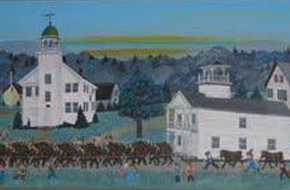Dan Billin

New Hampshire native Dan Billin worked as a newspaper reporter in the Granite State for seventeen years. His nose for a story and years of relentless research have brought to light a wealth of detail about the shocking and long-forgotten tale of Noyes Academy and the extraordinary Black students who dared seek an education in antebellum New Hampshire. He has now applied those same journalistic instincts to illuminating how putting the state motto, “Live Free or Die,” on NH license plates kicked off a battle over the First Ammendment.
Contact
Dan Billin
Lebanon, NH 03766
danbillin@hotmail.com
Home Phone: 603-276-8450
Available Program Formats: In person or online presentations
Dan Billin's Programs

Abolitionists of Noyes Academy
American slavery divided not just the North from the South, but also northerners from each other. In the mid-1830s, the emergence of an aggressive abolitionist movement provoked fierce blowback—including widespread mob violence in the North. Canaan, NH, became one of many New England flashpoints after abolitionists there opened a school for all students, regardless of race or gender. Young Black men and women flocked to Noyes Academy but were soon driven away by a voter-sanctioned mob that dragged their school building a half-mile down the main street and threatened them with death. Students who passed through that fire—Julia Williams, Henry Highland Garnet and Alexander Crummell—went on to extraordinary careers in the fight against slavery and for Black civil rights. Historian Dan Billin presents an illustrated lecture that plumbs the depths of anti-abolitionist sentiment in antebellum New Hampshire and the courage of Black students who were destined for greatness.

Last of the Granite State Rattlesnakes
Rattlesnakes were so common in colonial-era New Hampshire that dozens of places were named for them, ranging from the Massachusetts border to the White Mountains. They were so abundant some settlers could pay their property taxes with the bounties offered for killing them. Today, however, Crotalus horridus, the timber rattlesnake, is the state’s rarest native animal—only a handful are known to survive. State law protects them now, but that may not be enough to save them. Wildlife biologists have predicted this tiny remnant will die out without extraordinary intervention.
How did this feared and fascinating animal come to the very brink of extirpation in our state? This illustrated presentation maps how we got here through the social, political, and natural history of New Hampshire’s rattlesnakes. Historian and former newspaper reporter Dan Billin presents vivid, little-known stories and images from our centuries-long war on our rattlesnakes. Topics include who’s been bitten; the medicinal use of rattlesnake oil by the Shakers and others; the exploits of the “Rattlesnake King of New Hampshire”; the twentieth-century rattlesnake panic in the legislature; and the mysterious recent appearance of rattlesnakes with Pennsylvania genes. This program reviews what is and isn’t being done today to conserve our rattlesnakes, and the many obstacles to their survival.

Live Free or Die: The Contested History of the Words on Your License Plate
In 1969, when New Hampshire officials decided to put the state’s motto – “live free or die” – on its license plates, many citizens viewed the act as an endorsement of the deeply unpopular war being waged in Vietnam and protested by covering up or altering the motto. In response, authorities cracked down hard: arresting, fining, and sometimes even incarcerating those who engaged in duct-tape dissent. People appealed their convictions, sparking a legal contest over the First Amendment that went all the way to the U.S. Supreme Court. In this multimedia presentation, historian and former newspaper reporter Dan Billin tells a uniquely New Hampshire tale illustrating the genius – and the fragility – of the First Amendment.